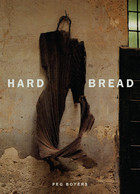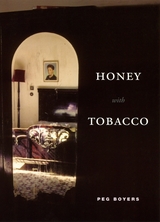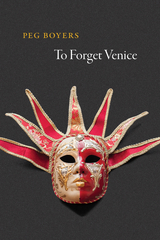

Pietà
This time the migraine came with a vision
bathed in night sweat:
I was sitting on the Eames chair,
your man’s body on my lap, legs
and arms white as casein draped over
mine, spilling onto the cassock, new sores
on your legs, dried blood
on your feet and hands,
from your chalk mouth
the words forgive me,
from mine, the impossible
no
Hard Bread,Peg Boyers’s debut poetry collection, with verse spoken in the imagined voice of the Italian writer Natalia Ginzburg, was widely praised for its inspired ventriloquism and its brilliant lyricism. In Honey with Tobacco, Boyers’s own intensely personal voice emerges in three strikingly distinctive variants. The first part of the book is the most explicitly autobiographical, bringing together poems that explore the poet’s Cuban American experience and a childhood marked by travel, the tropics, and varieties of disenchantment. The middle sequence of poems concerns a mother, a father, and a son, a postmodern holy family whose ordeals are evoked in a terse, terrifying narrative. In familiar tableaux drawn from the Bible that have inspired great works of art—the Annunciation, the Pieta, and Judgment Day—Boyers explores what it means in contemporary America to be “blessed among women” and whether and how art can contain grief. The final section of the book confronts age, desire, and regret in a series of personal poems that plumb baser human instincts and the speakers’ determination to dwell in darkness, when necessary, without abandoning the sacred.
Praise for Hard Bread:
“A great achievement of poetic voice . . . . It’s absolutely clear what these poems are ‘about,’ and they are unapologetic in their devotion to subject, clarity, precision, and accessibility.”—Steven Cramer, Poetry

READERS
Browse our collection.
PUBLISHERS
See BiblioVault's publisher services.
STUDENT SERVICES
Files for college accessibility offices.
UChicago Accessibility Resources
home | accessibility | search | about | contact us
BiblioVault ® 2001 - 2024
The University of Chicago Press









